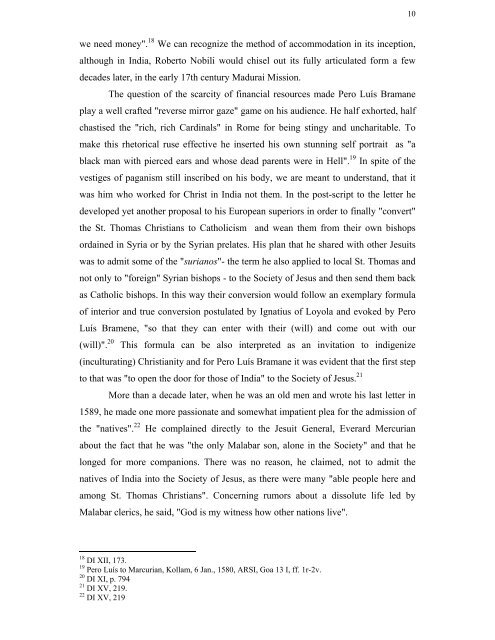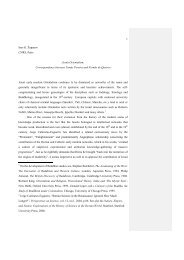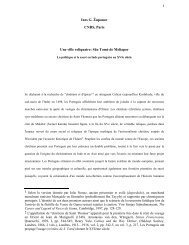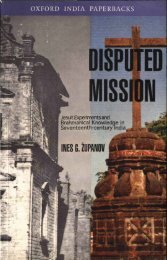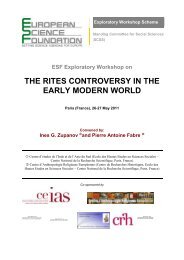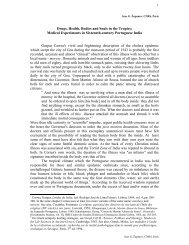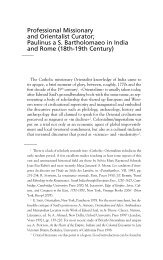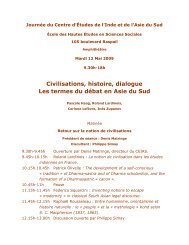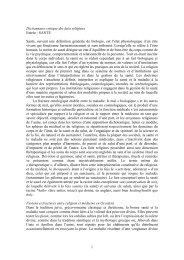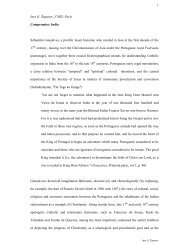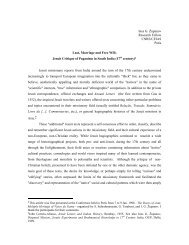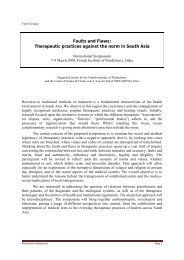Ines G. Županov, CNRS, Paris Portugal Índico Brown University ...
Ines G. Županov, CNRS, Paris Portugal Índico Brown University ...
Ines G. Županov, CNRS, Paris Portugal Índico Brown University ...
Create successful ePaper yourself
Turn your PDF publications into a flip-book with our unique Google optimized e-Paper software.
10<br />
we need money". 18 We can recognize the method of accommodation in its inception,<br />
although in India, Roberto Nobili would chisel out its fully articulated form a few<br />
decades later, in the early 17th century Madurai Mission.<br />
The question of the scarcity of financial resources made Pero Luís Bramane<br />
play a well crafted "reverse mirror gaze" game on his audience. He half exhorted, half<br />
chastised the "rich, rich Cardinals" in Rome for being stingy and uncharitable. To<br />
make this rhetorical ruse effective he inserted his own stunning self portrait as "a<br />
black man with pierced ears and whose dead parents were in Hell". 19 In spite of the<br />
vestiges of paganism still inscribed on his body, we are meant to understand, that it<br />
was him who worked for Christ in India not them. In the post-script to the letter he<br />
developed yet another proposal to his European superiors in order to finally "convert"<br />
the St. Thomas Christians to Catholicism and wean them from their own bishops<br />
ordained in Syria or by the Syrian prelates. His plan that he shared with other Jesuits<br />
was to admit some of the "surianos"- the term he also applied to local St. Thomas and<br />
not only to "foreign" Syrian bishops - to the Society of Jesus and then send them back<br />
as Catholic bishops. In this way their conversion would follow an exemplary formula<br />
of interior and true conversion postulated by Ignatius of Loyola and evoked by Pero<br />
Luís Bramene, "so that they can enter with their (will) and come out with our<br />
(will)". 20 This formula can be also interpreted as an invitation to indigenize<br />
(inculturating) Christianity and for Pero Luís Bramane it was evident that the first step<br />
to that was "to open the door for those of India" to the Society of Jesus. 21<br />
More than a decade later, when he was an old men and wrote his last letter in<br />
1589, he made one more passionate and somewhat impatient plea for the admission of<br />
the "natives". 22 He complained directly to the Jesuit General, Everard Mercurian<br />
about the fact that he was "the only Malabar son, alone in the Society" and that he<br />
longed for more companions. There was no reason, he claimed, not to admit the<br />
natives of India into the Society of Jesus, as there were many "able people here and<br />
among St. Thomas Christians". Concerning rumors about a dissolute life led by<br />
Malabar clerics, he said, "God is my witness how other nations live".<br />
18 DI XII, 173.<br />
19 Pero Luís to Marcurian, Kollam, 6 Jan., 1580, ARSI, Goa 13 I, ff. 1r-2v.<br />
20 DI XI, p. 794<br />
21 DI XV, 219.<br />
22 DI XV, 219


